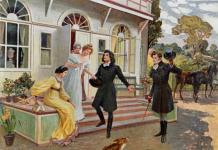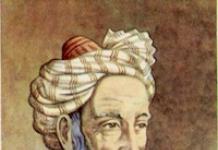Many critics condemn the modern Olympic Games as too corrupt and commercial, and accuse the organizers of having many professional athletes. They argue that modern competitions have tarnished the ideals of the ancient Greeks, who competed in the original games from 776 B.C. e. to 394 AD e.
The idea that the ancient Olympics brought together amateur athletes who competed solely in the name of peace and good sport is another part of Greek mythology. We suggest you familiarize yourself with the myths about the ancient Olympic Games. You will find a surprising resemblance to a modern sports festival.
The idea that only amateurs should compete in the Olympics is completely modern. It was developed during the revival of the Olympics in 1896. Real professionals took part in the ancient Olympic Games. Moreover, the Greeks did not even come up with a term that would denote an amateur, because the word "athlete" among them meant "one who fights for a prize."
The participants in the Olympic Games were not offered cash prizes, however they were in other Greek sports competitions. As it happens today, fame and fortune awaited the ancient Olympic champions upon their return home. The states gave cash prizes to their champions. Athens, for example, rewarded its winners with huge sums of money and other awards, tax exemptions, front-row theater seats, or lifetime free meals.
The Ancient Olympic Games Didn't Suffer from Fraud and Corruption
Regardless of the millennium, the lure of victory may be too tempting for some athletes. Although the ancient Olympians stood in front of the formidable statue of Zeus and swore to play fair, some of them were willing to incur the wrath of the gods just for the thrill of victory.
Athletes who break the rules could be disqualified. They could even be publicly flogged. Athletes and referees who were found guilty of bribery had to pay huge fines. Often this money was used to finance the construction of bronze statues of Zeus erected at the entrance to the stadium. “Victory must be achieved with the speed of the legs and the strength of the body, and not with money,” the inscriptions on the statues said. Obviously, not everyone listened to them: 16 statues were erected over the years of the games.
The first recorded gaming cheating scandal dates back to 388 BC. e., when the boxer Eupolus bribed three opponents to lose their fights to him.
But when politics began to interfere in the games, it elevated corruption to a new, almost farcical level. When the Roman emperor Nero decided to compete in 67 AD. BC, he offered astronomical bribes to the judges, who then agreed to add competitions in music and poetry reading to the general program. The Roman emperor also took part in chariot races. And although he fell out of the chariot and could not finish the race, the judges awarded him the main prize. Nero brought 1808 prizes from the Olympic Games and other Greek competitions.
Politics and war were absent from the ancient Olympics
Contrary to popular belief, politics has constantly intruded on the ancient sports festival. During the Peloponnesian War in 424 BC. e. Spartans were forbidden to take part in the games and even attend them. And although the sacred truce traditionally stopped all hostilities during the Olympic Games, in 364 BC. e. war came straight to Olympia. The archers defended it, shooting from the roofs of the temples. Security measures at the 2012 London Games repeated these events, with soldiers armed with surface-to-air missiles on rooftops.
The ancient Olympic Games were devoid of commercialism
The billions of dollars that the International Olympic Committee receives from corporate sponsors and television companies have raised the level of commercialism to heights never seen before. However, Olympic trading is not a modern invention. In the ancient games, only licensed merchants could sell food, drink, and souvenirs. Painters, sculptors and poets sold their works. Olympic organizers could fine merchants who raised the price of their goods. Images of champions appeared on specially minted coins and statues, which were made by government order.
Ancient Olympians trained on their own
Like many Olympians today, the athletes in the ancient games were well supported. They were assisted in training and education. As in modern countries, the Greek states invested money in sports facilities and hired instructors to help athletes with medicine, nutrition and recovery. Coaches of Olympic champions became famous and wrote popular study guides, which contained advice on exercise and diet.
The ancient Greeks attached great importance to the development of the body. Dexterity, strength and endurance were highly valued. In ancient times, people often had to fight. And to be a good warrior, endurance and physical strength were required.
The Greeks were very religious and believed that the outcome of the battle largely depended on the will of the gods, and not just on good preparation. It was a tradition to give glory to the gods, to make sacrifices to them, to arrange magnificent holidays in honor of the patron gods.
Events
Olympic Games- the most famous sports of ancient Greece.
- They were dedicated to the god Zeus.
- Held in a city in southern Greece.
- Games were held every 4 years, lasted 5 days.
- People from all over Greece came to the Olympic Games.
- For the duration of the games, all wars ceased and a sacred peace was declared.
776 BC The first ever Olympic Games.
The Greeks competed in:
- run,
- long jump,
- discus throw,
- javelin throwing,
- fight,
- chariot racing,
- run with weapons.
How were the competitions?
- Athletes (participants of the games) prepared very carefully.
- Only Greeks took part, only citizens (not slaves), only men.
- Athletes performed naked.
- A sacrifice was obligatory before the competition.
- The winners were awarded olive branches from the Sacred Grove.
- To become the winner of the Olympic Games was very honorable.
394- the last Olympic Games of antiquity. Greece was part of the Roman Empire, and Christianity became the official religion at that time. Emperor Theodosius I banned the Olympic Games as a pagan holiday.
1896- The Olympic Games have been revived and are still taking place.
Members
Parallels
The Olympic Games were not the only sporting event for the Greeks. There were other games dedicated to other gods and held in other cities. The second most popular after the Olympic Games were the Pythian Games, held in the city of Delphi. They were dedicated to the god Apollo, the tamer of the serpent Python. In addition to sports, musicians and philosophers competed at the Pythian Games.
The Pythian games have also been revived in modern times. Now these games are called Delphic, they host competitions and festivals of musicians, dancers, poets and designers, art exhibitions.
The Olympic Games in the life of the ancient Greeks were such a significant and grandiose event that they even had their own calendar. For the duration of the games, strife and strife were forgotten, wars stopped, and general peace was declared. Perhaps that is why Olympic athletes are still called the messengers of peace.
A few months before the start of the competition, ambassadors traveled to all Greek cities, inviting those who wished to participate in the games. According to ancient laws, all free Greeks could take part in the games, but only the strongest dared to enter the fight. Boys and men prepared themselves for competitions for years, but women were forbidden to take part in the games.
Once every four years, in the middle of summer, crowds of people flocked to Olympia (Fig. 1). Most of the competition took place in the stadium, which had an oblong shape. On one side it adjoined the foot of the hill. There was no seating for spectators. Spectators stood, sat or lay on the hill, as well as on the mounds lined with turf. There was no fee to visit the stadium.
On the first day, all athletes made sacrifices to the gods, swore to fight honestly and not to use forbidden tricks. The judges took an oath to judge the athletes honestly, to make a fair decision.
The following days were devoted to competitions in various types sports. Many competitions were held to the music.
The runners started (Fig. 2). Competitors on the command "Take a place foot to foot!" - took their places on the path. If one of the athletes took off before the signal, the judge punished him with a whip.

The speed of runners was legendary. They said that there was a runner who was seen only at the start and finish, no one saw how he ran the whole distance, he ran so fast. Another runner could overtake the hare, and the third ran so that he left no traces on the track.
In the long jump, to enhance the push, the athletes used stone or lead weights. At the moment of repulsion, the jumper threw out his hands with weights, first forward, and then sharply back.
On the treadmill, discus and javelin throwing competitions were held. The discs were stone or bronze, the largest weighing no more than 5 kg.
The most favorite type of competition was wrestling (Fig. 3). Wrestlers made extensive use of the bandwagon with grips on the arms and neck. To make it easier to deal with the enemy, they initially tried to throw him in the dust, so that the body, smeared with olive oil, would become less slippery. To win, it was required that the opponent touch the ground three times with both shoulder blades.

In addition to the pentathlon, equestrian competitions were held at the hippodrome. At the signal of the trumpet, the drivers waved their whips and the chariots rushed forward. They had to do 12 laps (about 13 km). The most dangerous were those places where it was required to go around the turntable. Often the horses reared up, because when turning the sun began to shine in their faces and they were frightened, so sometimes the races ended in the death of the charioteers. The owner of the horses did not always manage them himself, most often his servants did it, but the victory was awarded to the owner of the horses.
On the last day of the games, a table of gold and ivory was placed in front of the temple of Zeus. On it lay wreaths of the sacred olive tree. The winners in turn approached the chief judge, who laid wreaths on their heads. At this time, the herald called the name of the athlete and his hometown. Then the winners passed the circle of honor, and the audience shouted: “Glory, glory to the winners!”
When the winner returned home, all the inhabitants went out to meet him. An athlete in purple clothes approached the main temple and brought his wreath as a gift to the gods. The winner of the Olympic Games was given a statue, he was given places of honor in the theater, and until the end of his life he was fed at public expense.
Milo enjoyed the greatest fame (Fig. 4). Since childhood, he carried a calf on his shoulders and repeated this exercise daily. In 540 BC. e. Milon won the boys wrestling competition at the Olympic Games, he remained an invincible wrestler for thirty years. Usually Milo crushed the enemy, falling on him with the weight of his body. One day, no one dared to oppose Milo, and he got the victory without a fight. Heading to the judges for a wreath, the athlete slipped and fell out of the blue. Spectators demanded not to give a wreath to an athlete who falls to the ground without an opponent. But Milon proudly replied that he fell only once and really wants to see someone who can throw him a second and third time (the defeat was counted when the wrestler fell to the ground three times). There were no people willing to do it. The most amazing stories about the power of Milo were told. When he was at school, a column suddenly collapsed in the room where the classes were taking place. Milo held the ceilings in his hands until everyone left the house, and he ran out last. He often demonstrated strength: winding ox sinews around his head and holding his breath, Milo tore them apart with muscle tension. When Milo stood on a bronze throwing disc, poured with olive oil, no one managed to push him off the spot. Even the death of Milo was unusual. Being a deep old man, he wanted to break the stump with his hands, which the woodcutters could not cut with wedges. But the stump pinched his hand, and at night he became the prey of the wolves.

In the 5th century BC e. Fiagen became famous. When he was nine years old, he lifted a bronze statue he liked, which stood in the market square, onto his shoulder and took it to his home. Thiagen was forced to carry the statue to its original place, and the rumor about his strength spread throughout Hellas. During his life in various competitions, he received 1400 victorious wreaths.
The fame of the Olympic Games and outstanding athletes has survived the centuries.
Bibliography
- A.A. Vigasin, G.I. Goder, I.S. Sventsitskaya. Ancient world history. Grade 5 - M .: Education, 2006.
- Nemirovsky A.I. A book to read on the history of the ancient world. - M.: Enlightenment, 1991.
- Home-edu.ru ()
- Zdorovosport.ru ()
- Dic.academic.ru ()
- Greece78-3.narod.ru ()
Homework
- What conditions were required to comply with the inhabitants of Hellas during the Olympic Games?
- What sports were included in the program of the ancient Olympic Games?
- Who could take part in the Olympic Games?
- What awards and honors awaited the winners of the Olympic Games?
To use the preview of presentations, create a Google account (account) and sign in: https://accounts.google.com
Slides captions:
ancient greek olympic games
“All to Olympia! The sacred world is declared, the roads are safe! May the strongest win!" Every four years in Olympia, the ancient city of Greece, in the region of Elis in the Peloponnese, the Olympic Games were held. The first games took place in 776 BC.
The ancient Greeks created a legend about the appearance of the first Olympic Games. According to which the Games were founded by Hercules. At the request of King Zlida Avgii, Hercules agreed to clear all his famous stables in one day for a tenth of the herd. Augius agreed. Hercules coped with his Task on time, changing the course of two rivers, and directing them through the stables. The water quickly washed away the dirt. But King Avgiy refused to fulfill his promise. Hercules decided to take revenge on the king of Elis for deceit.
A few years later, Hercules returned with a large army to Elis, having defeated Avgii in the battle. Gathering his army and all the rich booty, Hercules made sacrifices to the gods and established the Olympic Games, dedicating them to Zeus.
Preparing for the games Almost a year before the start of the games, all participants started training in their hometown. Then the athletes passed the exam to the judges (elladonics). All free Greeks could participate in the games. The participation of women, persons of non-Greek origin, slaves was forbidden. The death penalty awaited violators.
Residents came to the Olympic Games not only from Greece itself, but also from the coast of Asia Minor, from Sicily. The games were dedicated to the god Zeus. All those who arrived in Olympia were considered "guests of Zeus" and were under his protection. No one had the right to enter the territory of Olympia with weapons On the eve of the Olympics, all strife and wars ceased A person who offended a traveler going to the Olympic holiday was severely punished The Greeks were afraid of the curse that the gods sent on the violator of the Olympic truce 1 or 2 Olympics
Rules for the ancient games At the first games, athletes competed only in the 192.27 m run. This distance was called "stages". From this word came the name "stadium". The Games were led by "elladoniki", they were both coaches and referees. The winners were called "Olympians". stadium in olympia
The pentathlon is the main competition: 1. Running, 2. Long jump, 3. Javelin throw, 4. Discus throw, 5. Wrestling.
The interest of the audience at the Olympic Games was also caused by other competitions: - boxing, - chariot competitions - horse racing
Olympic flame Lighting of the Olympic flame is the main ritual at the opening ceremony of the Games, the lighting is preceded by a torch relay. The Olympic flame burns continuously during the Games and is extinguished at the closing ceremony.
First day: sacrifice to the gods, oath of the judges, acquaintance of the participants with the judges and with each other. The next three days: competitions of athletes. Fifth day: rewarding of the winners (olympionists) in front of the temple of Zeus. Five unforgettable days
Poets, artists, orators and musicians performed in between competitions
The Olympic motto: "Citius, altius, fortius" (translated from Latin "Faster, higher, stronger" expresses the aspirations of the Olympic movement.
Awards for the winners The main award for the winner of the Olympic Games was a wreath of olive branches from an old tree planted by Hercules. In addition to the wreath, the winner received a palm branch. The name of the athlete was carved on marble columns along the river Alpheus in Olympia.
Olympionic, who won the competition three times, received the right to his statue in Olympia. He was presented with expensive gifts, exempted from taxes, appointed a life pension, provided a free place in the theater.
The return of the winner to his homeland turned into a truly triumphal procession.
The Olympic Games are still a symbol of strength, peace and justice today.
Olympic Emblem The intertwined rings symbolize the five continents united in the Olympic Movement. OLYMPIC RING COLORS Blue Europe Black Africa Red America Yellow Asia Green Australia
Modern Olympic Games Awards The major Olympic awards include Olympic medals. On the front side of the medals since 1928, the ancient Greek goddess Nike is depicted with a laurel wreath in her hand. On the reverse side - the sport in which the athlete participated.
On the topic: methodological developments, presentations and notes
Extra-curricular event on Olympic education. Quiz "Olympic Games" (grades 6-8)
The quiz is held in 4 rounds: "Warm-up", "Remove the excess", "Do you believe that...", "Heroes of sports". The quiz is accompanied by a multimedia presentation. The quiz can take part from 2 to...
The presentation demonstrates the participants of the Olympiad, Moscow records, Olympic oaths, the strongest team of the Olympiad, the heroes of the games....
The Olympic Games in Sochi are an event that even those people who are not sports fans are looking forward to in our country. “We are determined to organize a real celebration in 2014...
Everyone knows that the Olympic Games "originate" from ancient Greece - Hellas, where they were first held. But if we know a lot about modern games, then we know much less about ancient games. To fill this gap, here are some interesting facts about the ancient Olympic Games:
- the first time they took place in 776 BC (however, some historians push this date even deeper into the centuries)
- the name Olympic comes from the name of the village of Olympia, where they were held, and not from the name of Mount Olympus, where the ancient Greek gods lived
- the competitions were still dedicated to Zeus, the main Olympic god, and on the first day, athletes made sacrifices to their patron gods
- Initially, the “Olympiad” was not called the games themselves, but the four-year interval between them
- the ancient Greeks did not compete naked immediately, but only when the athlete finished first, from whom the loincloth fell. This incident was considered a divine signal. And the modern word gymnastics has remained for centuries, owing its origin to the ancient Greek word "gymos" - "naked", "naked"
- at the first Olympics in Ancient Hellas, they competed in only one form - running for one stage (192, 27 meters). This sport remained the only thirteen Olympics. Later, competitions were added in running to other distances, in throwing, jumping, chariot racing, wrestling and other sports.
- only men could participate in the competitions, women were not allowed to enter the stadium even as spectators. The only exception was the priestess of the goddess Demeter, for her a marble throne was built in the stadium in the most honorable place
 The winners of the ancient Olympic Games were called "Olympionists" and were awarded with an olive branch cut in a sacred grove, an olive wreath and olive oil in an amphora. Also, a lifetime monument was erected to the winner of the Olympics, he could be exempted from taxes, awarded a lifetime pension and have a number of other privileges.
The winners of the ancient Olympic Games were called "Olympionists" and were awarded with an olive branch cut in a sacred grove, an olive wreath and olive oil in an amphora. Also, a lifetime monument was erected to the winner of the Olympics, he could be exempted from taxes, awarded a lifetime pension and have a number of other privileges.- later, for women in ancient Hellas, their own special women's competitions were established - Gerai, dedicated to the goddess Hera - the wife of Zeus. There, the winners were also awarded olive wreaths and food supplies (part of a cow sacrificed to Hera)
- the most multiple champion of the ancient Olympic Games was the wrestler Milo of Croton, he happened to be an Olympian six times
- Koreb, a young baker, became the first winner of the first Olympiad in Ancient Greece in the one-stage race
- when chariot races appeared in the program of the ancient Olympic Games, this became the only opportunity for women to become Olympians, since it was not the driver who was recognized as the winner of the competition, but the owner of the horses and the chariot

- the ancient Greek athlete Arrichion won his last victory in pankration (pankration is an ancient fight without rules, in which it was forbidden only to bite and scratch the opponent’s eyes) already dead. His opponent used a choke hold, Arrhichion responded by twisting his toe, forcing him to surrender from pain. However, at that moment, he suffocated. The judges declared Arrhichion the winner

- participants and winners of the ancient Olympic Games in Ancient Hellas - Olympionists - were also philosophers - the well-known ancient Greek philosopher Plato and royal persons - the Armenian prince Varazdat
- although almost all ancient Greeks swam well, this sport was never included in the program of the ancient Olympic Games. Also, the marathon became an Olympic sport only in the modern Olympic Games.
- each athlete stood for his policy (city-state, of which ancient Hellas consisted). If he betrayed his city and advocated for another policy, then his house was destroyed or turned into a prison.
- for violating the rules of the competition, the participant was punished by beating with sticks, and for fraud and bribery, they could generally be stoned to death, since disrespect for the rules was perceived as disrespect for Zeus, the patron saint of the ancient Olympic Games
- since 394 AD, the Olympics were forbidden by the Roman emperor Theodosius the first, as a pagan relic. And they resumed already today in 1896
Once every four years, the Olympic Games are held - the so-called sports competitions, in which the best athletes from around the world participate. Each of them dreams of becoming an Olympic champion and receiving a gold, silver or bronze medal as a reward. Almost 11 thousand athletes from over 200 countries of the world came to the 2016 Olympic competitions in the Brazilian city of Rio de Janeiro.
Although these sports are mostly played by adults, some sports, as well as the history of the Olympic Games, can also be very exciting for children. And, probably, both children and adults would be interested to know when the Olympic Games appeared, how they got such a name, and also what types of sports exercises were at the very first competitions. In addition, we will learn how the modern Olympic Games are held, and what their emblem means - five multi-colored rings.
History of the Olympic Games
The birthplace of the Olympic Games is Ancient Greece. The earliest historical records of the ancient Olympic Games were found on Greek marble columns engraved with the date 776 BC. However, it is known that sports in Greece took place much earlier than this date. Therefore, the history of the Olympics has been around for about 2800 years, and this, you see, is quite a lot.

Do you know who, according to history, became one of the first Olympic champions? - This was ordinary cook Korybos from the city of Elis, whose name is still engraved on one of those marble columns.
The history of the Olympic Games is rooted in the ancient city - Olympia, from where the name of this sports festival originated. This settlement is located in a very beautiful place - near Mount Kronos and on the banks of the Alpheus River, and it is here from ancient times to the present day that the ceremony of lighting the torch with the Olympic flame takes place, which is then relayed to the city of the Olympic Games.
You can try to find this place on a world map or in an atlas and at the same time check yourself - can I find Greece first, and then Olympia?
History of the Olympic Games (briefly, in 3 minutes!)
How were the Olympic Games in ancient times?
At first, only local residents took part in sports competitions, but then everyone liked it so much that people from all over Greece and its subordinate cities began to come here, as far as from the Black Sea itself. People got there as best they could - someone rode a horse, someone had a wagon, but most people went to the holiday on foot. The stadiums were always crowded with spectators - everyone really wanted to see sports competitions with their own eyes.
It is also interesting that in those days when the Olympic competitions were going to be held in ancient Greece, a truce was declared in all cities and all wars stopped for about a month. For ordinary people, it was a calm peaceful time, when they could take a break from everyday affairs and have fun.
For a whole 10 months, the athletes trained at home, and then for another month in Olympia, where experienced coaches helped them prepare as best as possible for the competition. At the beginning of sports games, everyone took an oath, the participants - that they would compete honestly, and the judges - to judge fairly. Then the competition itself began, which lasted 5 days. The beginning of the Olympic Games was announced with the help of a silver trumpet, which was blown several times, inviting everyone to gather in the stadium.

What sports were at the Olympic Games in ancient times?
These were:
- running competitions;
- struggle;
- long jump;
- javelin and discus throw;
- hand-to-hand combat;
- chariot racing.
The best athletes were awarded an award - a laurel wreath or an olive branch, the champions solemnly returned to their hometown and were considered respected people until the end of their lives. Banquets were held in their honor, and sculptors made marble statues for them.
Unfortunately, in 394 AD, the Olympic Games were banned by the Roman emperor, who did not like such competitions very much.

Olympic Games today
The first modern Olympic Games were held in 1896, in the parent country of these games - Greece. You can even calculate how long the break was - from 394 to 1896 (it turns out 1502). And now, after so many years in our time, the birth of the Olympic Games became possible thanks to one famous French baron, his name was Pierre de Coubertin.
Pierre de Coubertin- Founder of the modern Olympic Games.


This man really wanted as many people as possible to go in for sports and offered to resume the Olympic Games again. Since then, sports games have been held every four years, with the maximum preservation of the traditions of ancient times. But now the Olympic Games began to be divided into winter and summer, which alternate with each other.
The Olympic Games: history, symbolism, how everything was born and how it came to winter Russia
olympic games pictures













Traditions and symbols of the Olympic Games
Olympic rings
Probably, each of us has seen the emblem of the Olympics - intertwined colored rings. They were chosen for a reason - each of the five rings means one of the continents:
- blue ring - a symbol of Europe,
- black - African,
- red - America,
- yellow - Asian,
- the green ring is the symbol of Australia.
And the fact that the rings are intertwined with each other means the unity and friendship of people on all these continents, despite the different skin colors.



olympic flag
The white flag with the Olympic emblem was chosen as the official flag of the Olympic Games. White is a symbol of peace during Olympic competitions, just as it was in ancient Greece. At each Olympics, the flag is used at the opening and closing of sports games, and then transferred to the city in which the next Olympics will take place four years later.


olympic fire
Even in ancient times, a tradition arose to light a fire during the Olympic Games, and it has survived to this day. It is very interesting to watch the ceremony of lighting the Olympic flame, it is reminiscent of an ancient Greek theatrical production.
It all starts in Olympia a few months before the start of the competition. For example, the fire for the Brazilian Olympic Games was lit in Greece back in April of this year.
In Greek Olympia, eleven girls gather, dressed in long white dresses, as they used to be in Ancient Greece, then one of them takes a mirror and, with the help of sunlight, lights a specially prepared torch. This is the fire that will burn throughout the entire period of the Olympic competition.

After the torch lights up, it is handed over to one of the best athletes, who will then carry it first through the cities of Greece, and then deliver it to the country in which the Olympic Games will be held. Further, the torch relay passes through the cities of the country and, finally, arrives at the place where sports competitions will be held.
A large bowl is installed in the stadium and a fire is lit in it with the torch that came from distant Greece. The fire in the bowl will burn until all sports are over, then it goes out, and this symbolizes the end of the Olympic Games.


Opening and closing ceremony of the Olympics
It is always a bright and colorful sight. Each country hosting the Olympic Games tries to surpass the previous one in this component, sparing no effort or means. For the production, the latest achievements of science and technology, innovative technologies and developments are used. In addition, a large number of people are involved - volunteers. The most famous people of the country are invited: artists, composers, athletes, etc.

Awarding of winners and prize-winners
When the first Olympic Games were held, the winners received a laurel wreath as a reward. However, modern champions are no longer awarded with laurel wreaths, but with medals: the first place is a gold medal, the second place is a silver one, and the third is a bronze one.
It is very interesting to watch the competitions, but it is even more interesting to see how the champions are awarded. The winners go to a special pedestal with three steps, according to their places, they are awarded medals and raise the flags of the countries where these athletes came from.

That's the whole history of the Olympic Games, for children, I think, the above information will be interesting and useful. You can supplement your story with a presentation about the Olympic Games.




































